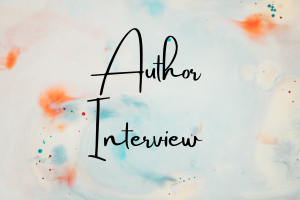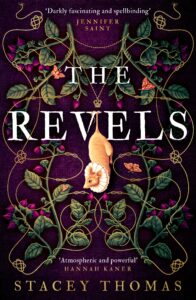Losing Herself in the Story: An Interview with Stacey Thomas
 Every once in a while, I do a little call-out for authors to contact me if they’d like to be a part of this interview series. Author Stacey Thomas is one who heeded the call and messaged me, and I’m thrilled that she did! Stacey is a freelance writer in London with bylines in Daily Express, The Mirror UK, The Bookseller, Bad Form Review, and more, and her debut novel, The Revels, released earlier this year. The book is the “story of the illegitimate son of a wealthy merchant who’s apprenticed to a witch-hunter during the English Civil Wars,” and readers are enjoying it. One reader said, “A book that brilliantly and evocatively captures the turmoil of the period, with a dark and clever ‘witch-hunter’ plot at its centre, which had me totally engrossed!” while another wrote, “[Thomas] did a brilliant job of taking a time period that’s often served as settings in pop-culture and giving it a fresh, entertaining spin.” I’m so grateful to Stacey for finding time in her schedule to answer my questions.
Every once in a while, I do a little call-out for authors to contact me if they’d like to be a part of this interview series. Author Stacey Thomas is one who heeded the call and messaged me, and I’m thrilled that she did! Stacey is a freelance writer in London with bylines in Daily Express, The Mirror UK, The Bookseller, Bad Form Review, and more, and her debut novel, The Revels, released earlier this year. The book is the “story of the illegitimate son of a wealthy merchant who’s apprenticed to a witch-hunter during the English Civil Wars,” and readers are enjoying it. One reader said, “A book that brilliantly and evocatively captures the turmoil of the period, with a dark and clever ‘witch-hunter’ plot at its centre, which had me totally engrossed!” while another wrote, “[Thomas] did a brilliant job of taking a time period that’s often served as settings in pop-culture and giving it a fresh, entertaining spin.” I’m so grateful to Stacey for finding time in her schedule to answer my questions.
Christina: Congrats on the publication of your debut novel, The Revels, which, as Elyse John writes, is “a darkly evocative tale about witch-hunting and the consequences it wrought on innocent women.” And you’ve said that the story was “inspired by the victims of the English witch-hunts and the real-life witchfinders who hunted them.” Have you always been interested in that time period and topic? Did anything in particular lead to this story?
Stacey: Thank you, Christina! I’ve been obsessed with witches, ever since watching The Craft, Sabrina The Teenage Witch, and reading Celia Rees’ Witch Child duology. I’ve also always loved history and was drawn to this particular period and topic due to the opportunity to combine my two interests.
I was inspired to write The Revels after coming across Matthew Hopkins, a real-life witch-hunter. Hopkins became a witch-hunter when he was just twenty-three years old, and I remember being horrified by the number of innocent people he condemned as witches. I wanted to explore the type of person who would become a witch-hunter and also understand the circumstances that allowed the witch-hunts to take place. All of these elements are what led me to write The Revels.
Christina: John also says, “While THE REVELS brings women’s history to light, it cleverly unfolds through the perspective of an unusual man.” Why this perspective? How did you decide which perspective to highlight?
Stacey: Originally, I went back and forth between having a male or female protagonist. Ultimately, I decided to write The Revels from a male viewpoint as I was excited by the prospect of exploring Nicholas’s privilege in being a man at a time when most suspected witches were women, alongside the vulnerability of being a witch who must take on the identity of a witch-hunter to protect himself.
I wanted to explore the lengths people will go to hide in plain sight and challenge myself by writing a character that’s so different to me, not just in terms of gender, but also in terms of their struggle to accept who they are.
Christina: What is it about historical fiction that calls to you? Do you feel the genre can do something other genres cannot? What’s your favorite time period to write about? And do you have a favorite person or event from history?
Stacey: I love historical fiction for its escapism. I know all books have that in common, but there’s something about historical fiction that allows me to lose myself in the story. The moment I open the book, I’m in another century, another world and able to experience what life was like for people in the past.
In terms of my favourite period to write about, it’s probably too early to say as I’m only on my second book. However, the 17th century will always hold a special place in my heart, mostly for the clothing. One of my favourite parts of writing The Revels was looking at paintings and noting the costume details.
My favourite person from history would probably have to be John Taylor, The Water Poet. He was one of the first working writers and I love how entrepreneurial he was when it came to promoting his writing as well as his ambition in developing his writing craft.

Christina: What is your research process like? Did you experience any obstacles in retrieving information? Did you unearth anything surprising?
Stacey: I rely upon my library a lot for my research. I wrote The Revels during lockdown and was extremely lucky in that my library sent me all the books I needed. When I’m outlining my story, I like to read books about that specific period, including biographies on leading figures, plays, pamphlets, etc. I also watched films set in the era and listened to podcasts like Witches of Scotland, That Shakespeare Life, etc., for further context.
There are so many surprising facts I can share, but for brevity’s sake, I’ll limit myself to two.
I’ll start with a gory titbit: Mummy. As early as the 15th century there was a trade to be found from extracting liquids from Egyptian mummies and selling them as medicine and even using them in paints (they were popular with the Pre-Raphaelites).
The second tidbit: Witches’ balls. I discovered this when I visited the Treasurer’s House in York and mistook the shiny silver ball hanging near the window for a Disco ball. It’s a witches’ ball, and in the 17th century, people believed that the ball’s shiny surface could nullify the evil eye of a passing witch.
Christina: I love your Instagram posts about your book deal. In Part 1, you talk about your love of writing and how you mostly wrote “in a self-conscious way” and that you “were worried what other people would think.” How did you get past those feelings? Any tips for writers and artists who might feel the same?
Stacey: I did creative writing courses at university and a lack of confidence, plus my struggle to find my voice, made me hold back. After I left university I stopped writing for a while. When I picked it back up again, I was still self-conscious, but slowly got over this when I realized that not everything I write is going to be great. Practice makes perfect! With this new mindset, I was able to find my voice and a renewed sense of confidence in my work.
For anyone who feels self-conscious about their work, my tip is to only share your work when you’re ready. I started writing The Revels during lockdown and the experience of writing just for myself, and without the pressure of anyone reading it, made me more confident in getting on with the story I wanted to tell as opposed to what I thought other people might like or expect.
Christina: The book was written while you were studying with Curtis Brown Creative. What are the top three things you learned that changed how you approach writing?
Stacey: The course taught me to be more intentional about my writing. Before, I’d try to write as much as possible, which often came at the expense of my character arc and storyline. The course made me realize that it’s good to slow down and think about what you want from your story.
My experience with Curtis Brown Creative also made me realize how important is it to read stories outside of your genre. I learnt so much by reading and critiquing my peers’ stories, and the experience helped me develop the skills to self-edit my work.
Another thing I learnt from the course is the art of patience. Writing is a long game and sometimes the book you’ve worked on for years isn’t the one that will get you a publishing deal. Although getting published is often the endgame, the important thing is to keep honing your craft so that you get better with each book.
Christina: Do you have other creative pursuits you tackle aside from writing? If you weren’t a writer, what other profession might you consider?
Stacey: I can’t imagine doing anything else but writing as it’s the only creative pursuit that I’ve loved enough to want to pursue professionally. That said, I used to do Renaissance dance at university and would have loved to pursue that professionally if I were better coordinated!
Writing is my main creative pursuit, but I love trying different things, like taxidermy and archery. I also love going to the theatre and art exhibitions for inspiration.
Christina: What does literary success mean to you?
Stacey: To me, literary success is being able to continue to write characters and stories that I love and that resonate with readers for as long as possible.
Stacey can be found in multiple places!
Writing portfolio: https://muckrack.com/stacey-thomas-3
Instagram: @staceythomaswrites
Twitter: @Staceyv_Thomas
TikTok: @staceythomaswrites
Thanks to Stacey for agreeing to this interview! If you know of an artist, author, or podcaster who’d like to be featured in an interview (or you are an author who would like to be featured), feel free to leave a comment or email me via my contact page.

